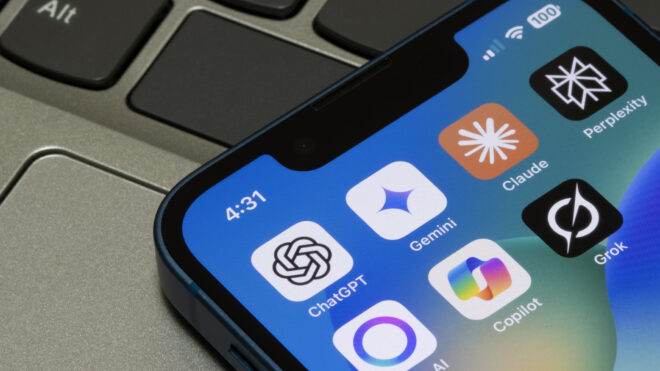
AI technology has been a hot button topic of late, as tools like OpenAI's ChatGPT or Google's Gemini have become more widely used. But with the infiltration of new technology comes a fear of change from many who are unfamiliar with AI, or artificial intelligence, and what exactly it means for things such as education in particular. Parents and teachers may worry that these tools can lead to students cheating rather than learning. But there are actually a lot of positive ways that AI technology can influence education.
CafeMom spoke with Nhon Ma about the power of AI tech when it comes to school. He's the CEO at Numerade, an education technology company that pairs information from real educators with AI to deliver tailored online tutoring options to students at a much more affordable cost than a traditional private tutor. Ma calls it the "democratization of tutoring."
After speaking with Ma, we've discovered how AI can impact our kids' schooling in a good way. Keep reading to learn all about it.
More from CafeMom: 10 Tips for Getting Your Kids Up and Out on School Mornings
Promotes democratization of tutoring.

One of the biggest draws of AI in Ma’s mind is how it can bring the benefits of private tutoring to all kids. “I see AI as being used to democratize those type of insights normally relegated to certain classes of families that can afford that,” Ma tells us.
Have a conversation.

Parents or teachers who are concerned about AI, particularly its potential for helping to cheat, need to be up front about the technology with their children, says Ma. “Students are using it, definitely. We just have to make sure they’re steered in a way where they’re actually learning,” he shares. “So there needs to be an honest conversation about, ‘Hey … we want you to use this as a way to learn, but not just to get the answer.'”
If students understand the value of actually learning versus just completing the work, hopefully they’ll understand that AI is a tool, not a crutch.
Rapidly grow a child's vocabulary.

Ma says his son was born deaf and later got a cochlear implant, but Ma worried his son would be behind in language development if he didn’t hear enough words early in his life. He says it’s obviously still important for parents to read to their own kids and form those bonds, but AI tools can also fill in gaps to make sure kids are getting that early access to hearing and learning lots of new words.
And when kids get old enough to start reading on their own, AI apps like Ello can provide coaching by listening to how a child reads a story and providing helpful feedback.
Help college applicants.

“The college admission process is actually getting even more competitive,” Ma tells CafeMom, even as “acceptance rates are still dwindling.” In that environment, why shouldn’t a high school student use every tool at their disposal to get their application to stand out?
Of course, cribbing an entire essay from ChatGPT is never a good idea, but running an essay through AI software such as Grammarly to detect grammar issues or structure problems can help the student fix those issues before submitting material.
Level the standardized test playing field.

According to ACT.org, students with private tutors reportedly did better on their ACT standardized tests. With AI programs like Numerade, private tutoring suddenly becomes available to everyone, which can help students studying for standardized college entrance tests.
More from CafeMom: 10 Real-Life Schools Where Some of Your Favorite TV Shows & Movies Were Actually Filmed
It can be a tool for teachers.

Ma hopes teachers can see AI as a tool to benefit their teaching. “Educators should see to leverage AI as a way to … reduce all the mundane work that they do on a day to day basis,” he explains.
By using AI tools to help with tasks such as lesson planning, teachers can be freed up for things like more one-on-one instruction, which is hugely beneficial to students.
It can be tailored to each student.

At Numerade specifically, Ma wants to replicate how a real tutor would get to know a student and the way that student learns. Using AI technology, online tutoring can now be tailored to each kid very easily.
“The AI actually remembers the students, what their weaknesses and strengths are … and then we map out an individualized study journey for that student,” he says.
This is especially helpful for kids who learn in different ways, be that kids who are visual learners, text-based learners, etc.
Encourages engagement in a private way.

For students who may not feel comfortable speaking up in school to ask questions, Ma thinks AI technology can allow kids to feel more comfortable engaging.
As he explains, “What we’ve learned is that allowing students … a time and space that is their own, where they can ask questions, go back to specific moments within a video, and relearn them without needing to raise their hand in class and being perceived as, ‘Hey, I may not know this,’ … giving them that space to actually learn the material is working out well.”
It can help focus the learning process.

It’s easy to misunderstand one fraction of a topic in the classroom, and that leads to being confused about everything that comes afterward. “Everything’s sequential, and so oftentimes students just don’t have the mastery of prior topics to then proceed further,” Ma says. He wants programming like Numerade to combat that.
“If a student is stuck on step number two of a calculus or physics question, we know that,” he tells us. “And then we can go deeper into that subject.”
Finding the right kind of chatbot.

It’s true that relying on a tool like ChatGPT for schoolwork can be a slippery slope, in part because sometimes the information can be incorrect. It’s also, for younger kids, giving them access to a ton of topics that maybe parents don’t want their children asking questions about yet.
Numerade’s chatbot Ace is powered by that ChatGPT technology, but it’s focused on school subjects like STEM. We asked it who Taylor Swift was, and it told us it didn’t know. But if we asked what the powerhouse of the cell was, it was quick to tell us mitochondria.
Numerade could be a good way for parents to ease into the AI world because it’s somewhat limited in scope, and the company works with real teachers to ensure that its outputs are accurate.
AI goes beyond text.

A lot of people’s engagement with AI at the moment is via text-based outputs from such things as Google’s Gemini or ChatGPT. But Ma is excited about all the facets AI presents the learning space, like the AI video content that Numerade produces.
“Having visuals there, sight, and sound helps with the actual learning process where students are not actually cheating, but they’re actually seeing, and they’re interpreting this and they’re actually learning it,” he says.
The cost is minimal.

The average cost of a private tutor can run between $25 to $80 an hour and up to $100 for test prep tutoring, according to Tutors.com. In comparison, Ma says that Numerade costs about $20 per month. The company, however, also partners with some schools and universities to provide their students with Numerade for free.
Advocate to the child's school.

Ma says parents can definitely try to advocate for AI tools with their children’s teachers and school boards to try to get those partnerships in place so all the students can have access. As this type of technology continues to pervade all areas of our lives, this can be one way to harness it for the betterment of our kids’ education.
Lead with understanding, not fear.

Changes to the status quo can seem scary, but technology will always continue to grow and impact education in different ways. For Ma, he hopes people learn to understand what AI can do rather than fear it.
“Fear is a sign of growth opportunity,” he says. “Fear is rooted in just the need just to understand it a bit more.” He adds, “This is gonna make the teaching profession even a whole lot better, just because all these teachers and educators … their allocation of the day will go toward the more valuable.”
Time will tell, but we can start embracing the positive attributes of these types of tools now.
There are ripple effects.

AI technology doesn’t just help even the tutoring playing field. Using these tools can have a ripple effect. Ma hopes that Numerade can genuinely help students learn better, which “then builds competencies and confidence in themselves to continue on this growth path. And that just has outsized impact on their families or communities at large.”
Getting a good education can change someone’s entire life, and AI tools can help bring that higher level of learning to everybody.







